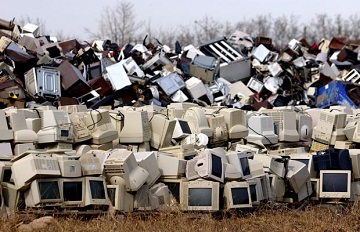Recycler faces 24 federal charges for export of hazardous e-waste
 A Surrey company, Electronics Recycling Canada, has been charged with 24 federal counts related to the unlawful export of hazardous recyclable material — lead-acid batteries, nick-cadmium batteries, and cathode ray tubes.
A Surrey company, Electronics Recycling Canada, has been charged with 24 federal counts related to the unlawful export of hazardous recyclable material — lead-acid batteries, nick-cadmium batteries, and cathode ray tubes.The charges against 0831689 B.C. Ltd. — doing business as ERC — and its president Sai Feng Guan fall under the federal Export and Import of Hazardous Waste and Hazardous Recyclable Material Regulations. The offences allegedly occurred from Aug. 14 to Nov. 10, 2011.
The next appearance in Surrey Provincial Court is April 17.
Export of electronic waste such as from old computers falls under the Basel Convention, adopted in 1989 to regulate the transboundary movement of hazardous wastes. Canada and China are signatories to the convention.
The convention was a response to human and environmental concerns associated with the improper processing of electronic waste, especially in developing countries.
Jim Puckett, executive director of the Seattle-based Basel Action Network, a watchdog group for violations under the Basel Convention, said that under the convention, China has “banned the importation of all e-waste and have notified the Basel Secretariat to that effect.”
ERC’s website states the company is “part of a global network with partners in the USA, Europe and Asia” and specializes in the “environmentally friendly disposition of e-Waste and other electronic components with minimal waste, minimal harmful emissions and maximum re-usable raw materials retrieval.”
The website says it has branch offices in the U.S. in Nevada, Arizona, Colorado, and Oregon.
BAN issued a report in 2002 entitled Exporting Harm: The High-Tech Trashing of Asia, in which it estimated Canada exported 20,000 tonnes of computer waste to Asia that year.
Puckett said prosecutions against such companies in Canada are relatively rare and when they do occur typically tend not to result in convictions that represent a real deterrent.
Environment Canada refused to comment Monday while the matter is before the court.
Puckett said he is glad to see the charges laid, which means Environment Canada is “doing a modicum of enforcement,” but noted a major past investigation resulted in fines of only about $2,000 against offending companies.
“That’s what you can make in profit from one container,” he said.
In 2006, an investigation by federal agencies seized 50 containers loaded with about 500,000 kilograms of metal and plastic scrap destined for China and Hong Kong at the port of Vancouver.
A total of 27 companies, most of them from Quebec and Ontario, were assessed out-of-court administrative penalties of $50,801 — less than $2,000 apiece — under the Customs Act.
The waste included thousands of computer monitors containing products such as lead, along with lead-acid batteries, and fluorescent lamp ballasts containing polychlorinated biphenyls (PCBs), proven to be toxic to both the environment and humans.
Federal officials refused to release the names of the companies because they were dealt with outside court.
In more recent court cases with Vancouver connections:
• In January 2011, Jieyang Sigma Metal Plastic Inc., a parent company of J.S. Chen Recycling, of Toronto, was fined a total of $30,000 in Ontario after pleading guilty to three charges of violating the Canadian Environmental Protection Act and two charges under the Transportation of Dangerous Goods Act. During inspections at the Port of Vancouver, the Canada Border Services Agency’s export unit examined two containers holding about 1,200 used lead-acid batteries and seven cathode-ray-tube monitors. One container had been refused entry by China and was returned to Canada. The second container was destined for Hong Kong, but never left.
• In February 2010, CC Ever Better International Co. Ltd. of Toronto, was fined $15,000, in Ontario after pleading guilty to one count under the Canadian Environmental Protection Act. An investigation at the port of Vancouver of a shipment destined for Hong Kong uncovered about 30 skids of broken and non-working computer monitors containing cathode-ray tubes.
You can return to the main Market News page, or press the Back button on your browser.

